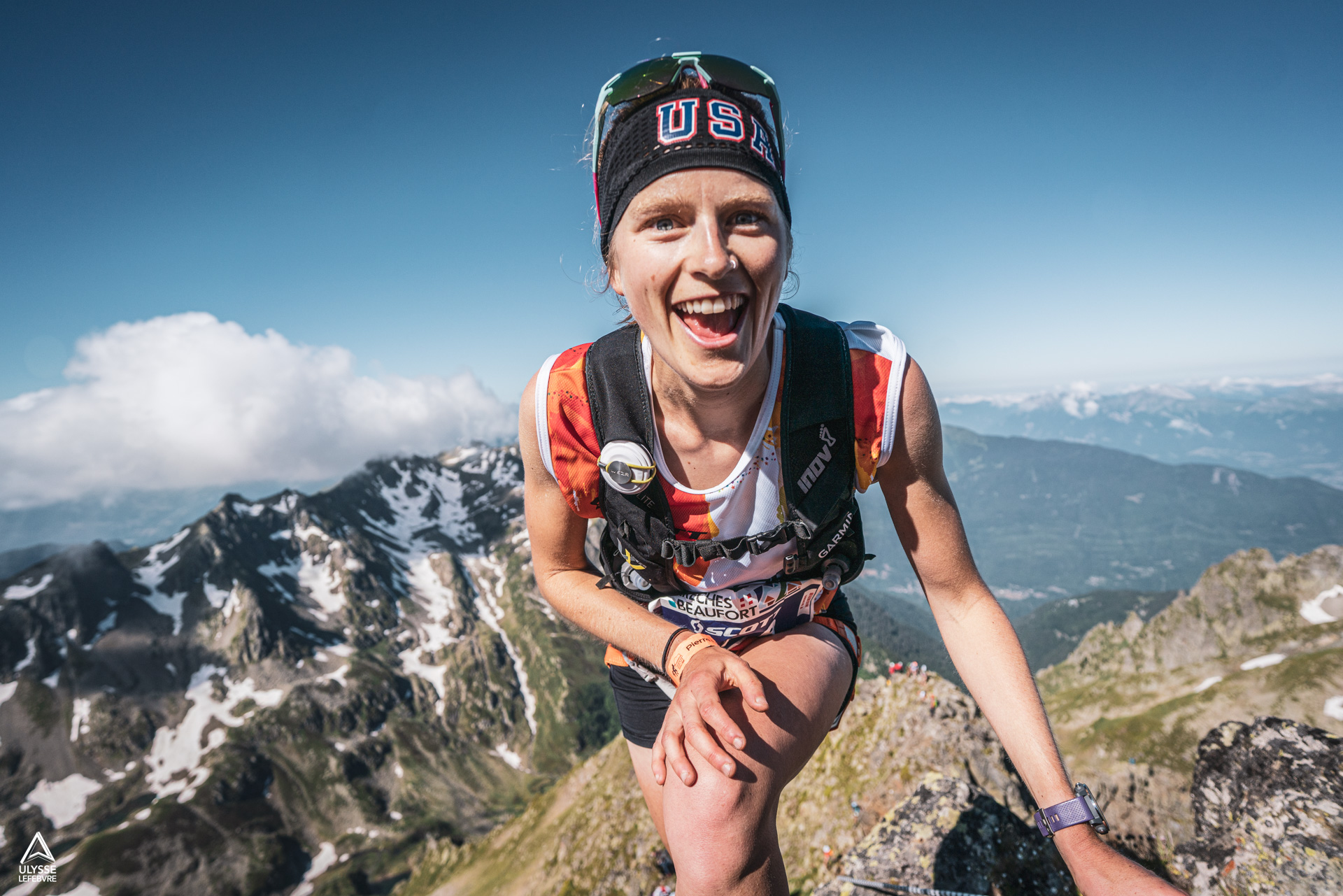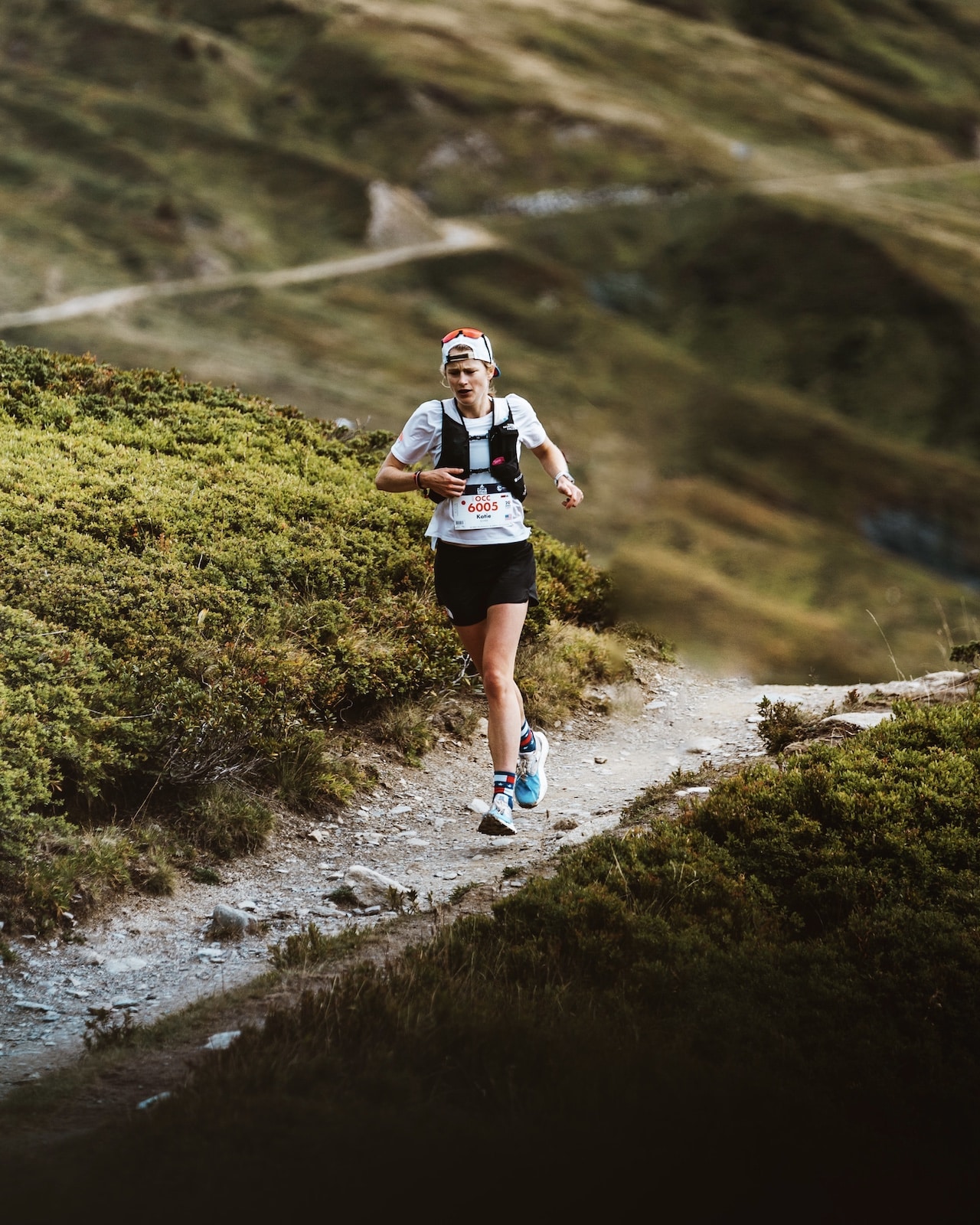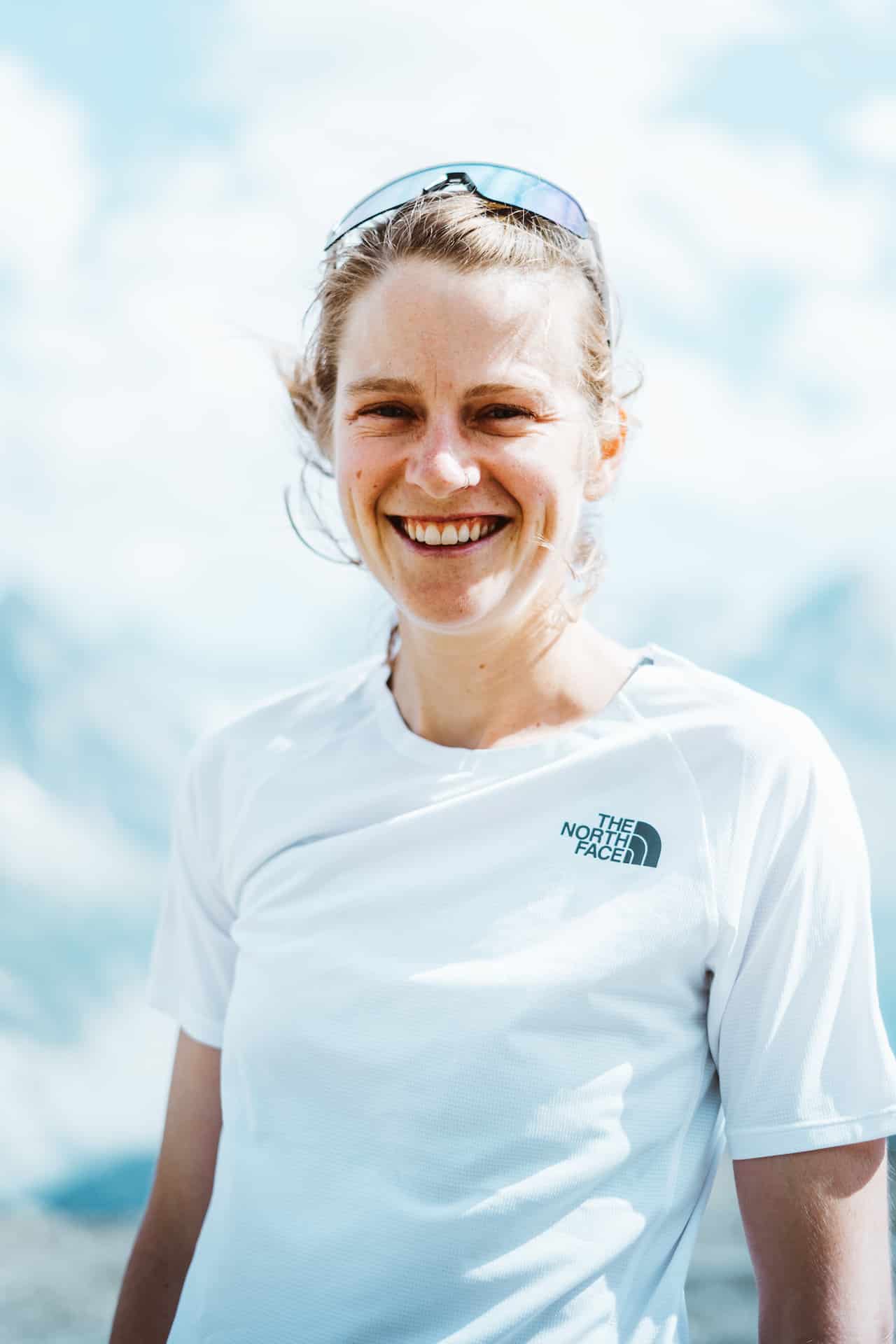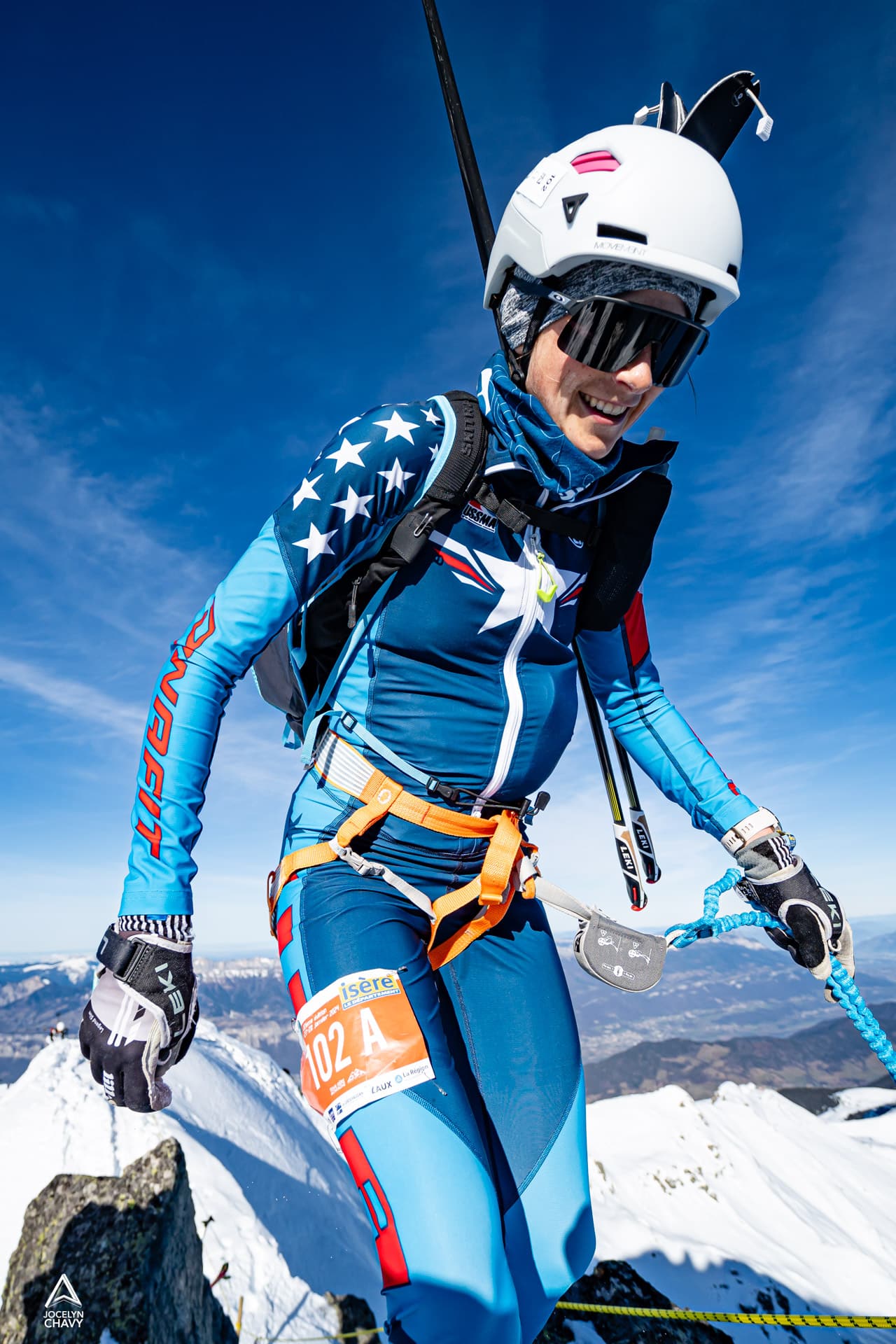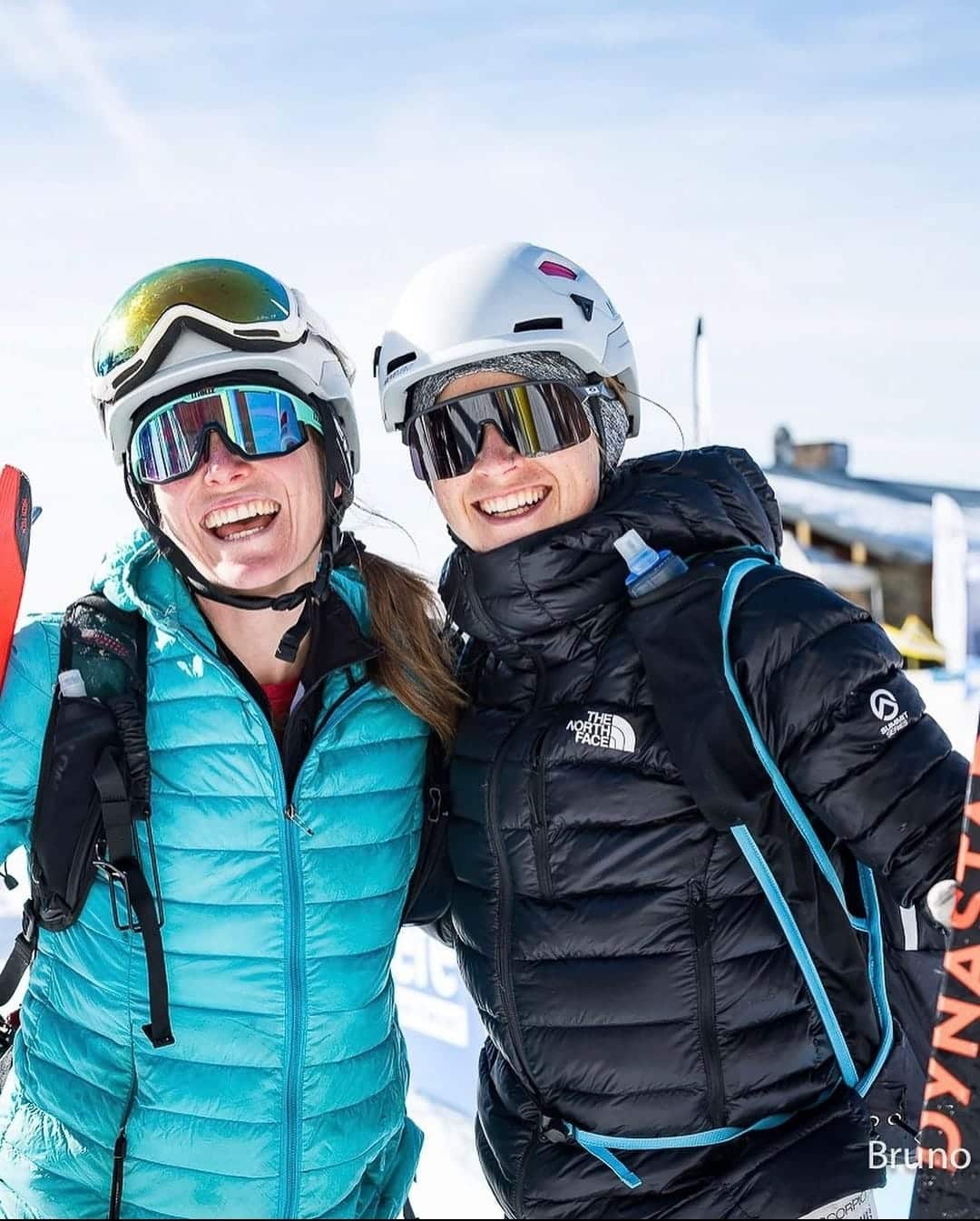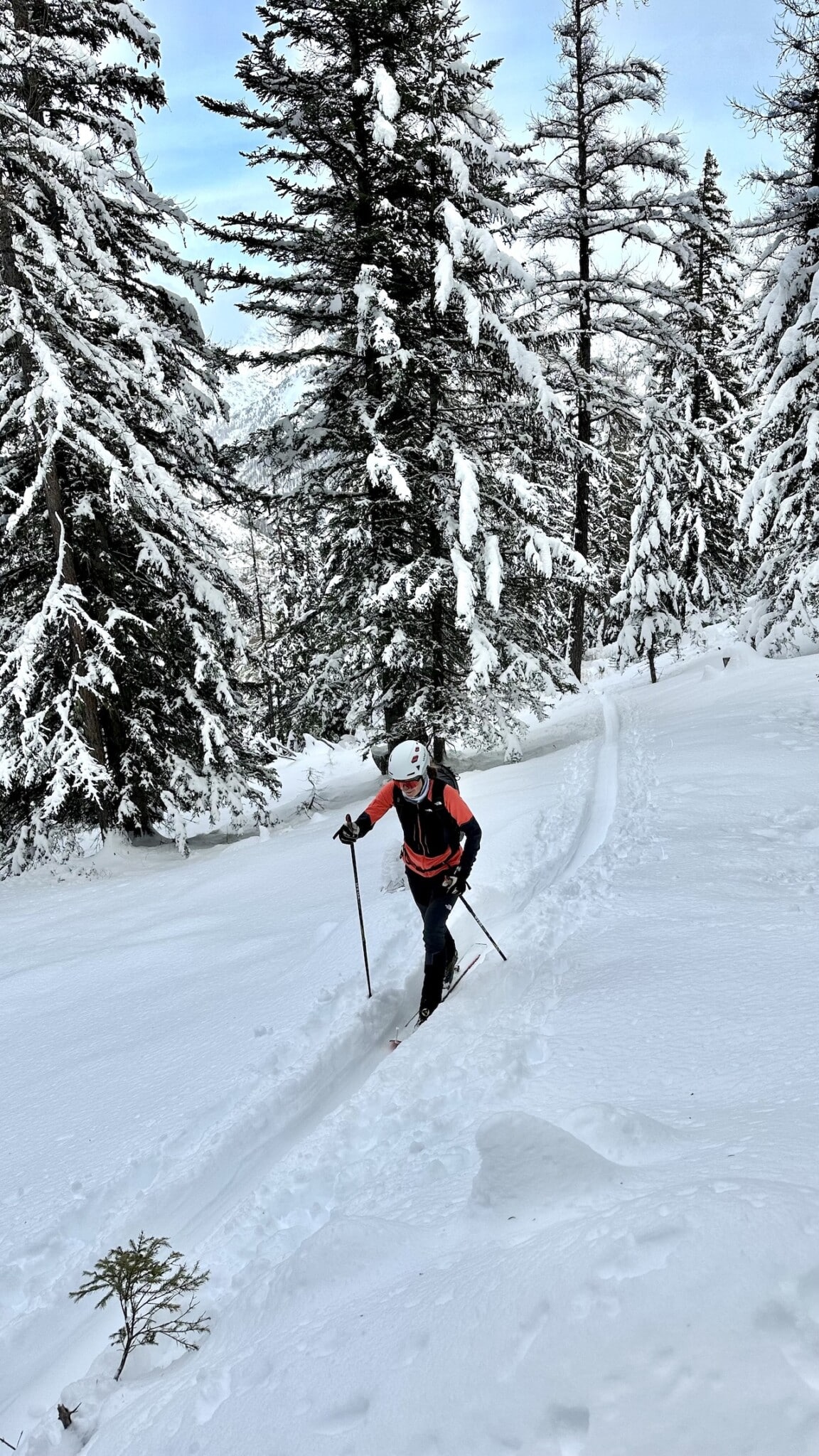Trained as a geologist, American Katie Schide has been part of the trail gotha for several years now. When Courtney Dauwalter isn’t present, it’s Katie who takes the gold medal. She has even suggested skimo to Courtney. But for now, it’s Katie who’s winning medals on the Belle Étoile, the Grande Trace and the Combe bénite in 2024. What does she have planned for 2024? What does she think of the Olympic formats for her favorite disciplines? She answers our questions.
Born in 1992, Katie Schide is a well-known trail runner. In the absence of Courtney Dauwalter, she won the women’s ultra-trail reference race (UTMB) in 2022. In 2023, she finished second in the Western States – we’ll let you guess who was first – and won the Grand Raid de la Réunion far ahead of runner-up Camille Bruyas.
Now living in the Southern Alps with her partner, traileur Germain Grangier, she also lines up at the start of ski-mountaineering races, which she appreciates for their complexity. Having settled in the mountain world several years ago, the geologist shares her views on ski-mountaineering and trail running at the Olympic Games, her greatest enemy and her plans for 2024.
How did you get into the mountain, trail running and ski mountaineering scene?
Katie Schide: I grew up in Maine (USA) and did a lot of hiking with my dad. I grew up going to the mountains, but not like people in the Alps do. We had to drive for hours before we really got there. But I think my strong connection to the mountains comes from working in refuges in the White Mountains (USA) for four summers when I was a student.
It’s a special system of eight huts with between 5 and 10 people working in them. We’re all students, about the same age and at the same stage in our lives, so there was a great atmosphere. We don’t make a very good living, it’s more a job to enjoy the beautiful surroundings and meet people. We served breakfast and dinner to the guests and took fresh food to the huts twice a week. And we took care of maintenance. We were very busy, but when it wasn’t our turn to cook, we could go hiking all day.
I moved to utah
And realized that there were trails one could run on
I really did a lot of hiking when I was there, there were so many possibilities! We often went to visit our friends who were in the other huts, and as we were always late, we tried to get back as quickly as possible. We couldn’t really run because the trails were so technical, but we would jump from rock to rock. So after four years of practice, I guess I got used to it and it really helped me with my trail training. I’m not the best on technical trails, but I feel like I don’t have to work on that specifically.
And then I moved to Utah for my Masters in geology, I realized that there were trails one could run on, I went backcountry skiing… When I moved to Zurich in 2016, I was able to delve even deeper. Every year a little more, but little by little!
With all this, you’ve discovered that you’re “happier in motion”, as you describe yourself on the website The marmots you have with your partner Germain Grangier?
Je pense que la plupart des jeunes sont actifs, mais c’est vrai que je cherchais toujours quelque chose à faire, en particulier à l’extérieur. C’est d’ailleurs pour cela que j’ai choisi d’étudier la géologie. Ça se concentre sur l’extérieur, la formation des paysages. J’aimais pouvoir étudier le monde de la nature.
In the United States generally speaking, we’re encouraged to do a lot of sport when we’re children. School and university provide lots of opportunities, so it’s a bit of a norm to be on the move and I’ve always loved that. At university I did hockey, kayaking… There was always something to do.
I think most young people are active, but it’s true that I was always looking for something to do, especially outdoors. That’s why I chose to study geology. It focuses on the outdoors, the formation of landscapes. I loved being able to study the natural world.
Have you managed to concile your life as a geologist AND a runner?
No, you can’t really do both. I was very lucky because when I was doing my doctorate, my bosses understood that my career as a semi-professional runner at the time was very important to me. They were very flexible about the time I worked in the office or at home.
It wasn’t really a balance, it was more like trying very hard to do both but not doing either 100% of the time. And after my PhD, I never worked as a geologist. I went from being a semi-pro runner to a pro.
What are your plans for 2024?
I’ve just done my last ski mountaineering race of 2024. I’ve done it. Now it’s time to race! My first race of the year will be The Canyons, a 100K. It’s in the same region as the Western States. I’ll be taking part at the end of June. After that, I haven’t confirmed anything yet.
It’s fun to compete in a sport I know a little less about
with so many things to think about
This winter, I did a few Verticales in the Southern Alps where I live. I also did La belle étoile [Katie Schide, with team-mate Julie Roux, finished second in the women’s race, editor’s note], Grande Trace [with the same team-mate, they finished third in the women’s race] and Combe Bénite [she finished first in the women’s individual race].
It’s always cool to do skimo races, it’s fun to compete in a sport you know a little less about. There are so many things to manage apart from physical fitness during these races! They’re very fast races because there are so many challenges to take up, so many things to think about during the race: managing transitions, going from climbs to descents. You concentrate totally on these things for two or three hours and it’s great to do competitions like this in the wintertime.
Katie and her team-mate in skimo, Julie Roux. ©Coll. Katie Schide
Last July, I interviewed Courtney Dauwalter and asked her if she was thinking of taking part in other races, such as skimo. She replied that you’d discussed it together while you were running the Western States. Is this something you plan to do together? Or was she joking?
[Laughs] Unfortunately, she was joking with you. When we were running together at the time, I’d just tell her she should do ski mountaineering because she’d be good at it. I don’t think most people realise it, but she was a very high-level Nordic skier at school. There’s a bit of a myth that she came from nowhere, but she comes from a very high level of sport.
I simply told her that she could be super strong in ski mountaineering because she knows how to ski on thin skis and she’s physically fit. She just needs to change her equipment!
It’s a shame, I’d already imagined you both doing the Pierra Menta as a team…
Where she lives, it’s difficult to train. But maybe one year I’ll manage to convince her… I just think she likes racing too much for that.
Just having an overall ranking
reduces the possibility of talking about women in race results
As a trail runner AND ski, how do you train?
I’ve just finished the ski mountaineering season, I’m going to Gran Canaria with my sponsor The North Face for a little trail running camp, then I’ll start running a bit more in the next two weeks. But otherwise, I’m not changing much from what I’m used to. Last year’s training seems to have worked, so I’m hoping that if we keep the same type of structure and build on the experience of the 2023 races, it’ll be even better! We’ll have to wait and see.
What do you think of separate rankings for men and women ultra-trailers? Do gender-based rankings still make sense in trail running in 2024?
I think it makes sense to have a ranking by gender and an overall ranking. I think that if we start ranking only in general, we’ll forget about the women because, physiologically speaking, men are more likely to win a race. Just having an overall ranking reduces the possibility of talking about women in race results.
On the other hand, I like to be able to say that I came 20th overall and 2nd in the women’s race, for example. It helps you understand the general context of the race and where you are in it. And that’s important.
Skimo and trail running
in the Olympics
Good idea?
What is your opinion on the format of the skimo events at the 2026 Olympic Winter Games, which does not include an individual race?
I probably think the same thing as everyone else: we’re all disappointed that there’s only the sprint and relay, but it’s also a test year. It’s not even confirmed that ski mountaineering will be at the Olympics in 2030 and beyond, so I’m putting things into perspective. In 2026, we’re already going to see how the events unfold in this format. But it would obviously be better if there was an individual race!
And is trail running in the Olympics a good idea?
Given what they’ve done with ski mountaineering, I’d say it’s not a great idea. As it’s really based on the media and ratings, they have to take a sport and reduce it to the most compact and easiest way so that a large audience can see it on television. That’s a shame. But on the other hand, if trail running ended up in the Olympics, it would bring a lot more visibility to our sport, more support from sponsors and therefore help more athletes. So I don’t want to say that I’m totally against it.
Personally, I think it would be stupid to make runners race on a loop, but there is the positive side of visibility. So I’m not sure. What would be more logical would be for them to start by putting cross-country at the Olympics. I’d love to see that!
Trail running isn’t a creative sport at all
you go to a start line, they show you where to run and you run
Who inspires you, in the mountains, in sport or in life in general?
That’s a tough one, I don’t think there’s a good answer. I’m inspired by top-level athletes, whatever their sport, because it’s really interesting to see how other sportspeople approach their job and try to perfect what they do.
But I’m also very inspired by someone like Benjamin Védrines, for example. Someone who always approaches his job from a creative angle. You always have to come up with ideas. Trail running isn’t a creative sport at all because you go to a start line, they show you where to run and you run. But people like Benjamin Védrines create projects, come up with ideas and motivate themselves. They create their own routes and challenges and they do it with great performance but also with creativity, so that’s really cool.
Other people who really inspire me are the guys we ski with. They’re in their sixties, they’ve lived in this valley all their lives and they wake up and put their skis on, whether the snow is good or bad. I love meeting and spending time with different people, you learn a lot about how everyone manages their lives, their passions, their joys and their sorrows.


